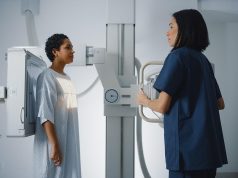Findings seen among HR-positive, HER2-negative, node-negative early breast cancer patients with recurrence score of 11 to 25
By Elana Gotkine HealthDay Reporter
MONDAY, Dec. 12, 2022 (HealthDay News) — For patients with hormone receptor (HR)-positive, human epidermal growth factor receptor 2 (HER2)-negative, node-negative early breast cancer (EBC) with a 21-gene recurrence score (RS) of 11 to 25, adjuvant endocrine therapy (ET) is noninferior to chemotherapy plus ET (CET) during follow-up exceeding 10 years, according to a study presented at the annual San Antonio Breast Cancer Symposium, held from Dec. 6 to 10 in San Antonio.
Joseph Sparano, M.D., from Mount Sinai Health System in New York City, and colleagues reported an updated analysis of a trial involving women aged 18 to 75 years with HR-positive, HER2-negative T1b-T2N0 EBC who agreed to be randomly assigned to adjuvant ET or CET based on the RS assay. Invasive disease-free survival (iDFS) in the RS 11 to 25 group was assessed as the primary end point. The updated analysis was performed after a median follow-up exceeding 10 years.
The researchers found that the conclusions of the primary trial after a median of 7.5 years remained unchanged in the updated analysis: In the randomly assigned group with RS of 11 to 25, ET was noninferior to CET. For an RS of 0 to 25, recurrence occurred in <10 percent by 12 years; however, late recurrence events beyond five years exceeded earlier recurrence. At 12 years, about 13 percent had nonrecurrence events, contributing substantially to the iDFS rates. For women aged 50 years or younger, the 12-year iDFS rate was improved for the CET versus the ET-alone arm for RS 21 to 25 (82.4 versus 75.0 percent) and RS 16 to 20 (84.8 versus 77.2 percent), while for RS 11 to 15, the outcomes remained similar (83.9 versus 82.3 percent).
“There is a higher risk of developing a new breast cancer or other cancer than having a recurrence of the original cancer, pointing out the need for vigilance in cancer screening after a breast cancer diagnosis,” Sparano said in a statement.
Several authors disclosed financial ties to the pharmaceutical industry.
Copyright © 2022 HealthDay. All rights reserved.








